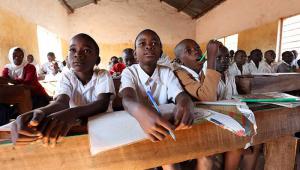Janet Museveni, Uganda’s minister of education and sports, announced last week that the government will close the 63 for-profit nursery and primary schools run by Bridge International in the country after deciding they fell short of standards on education, hygiene and sanitation.
Bridge International has been funded by the World Bank, the UK’s Department for International Development, Bill Gates and others.
In a statement to parliament, Museveni said that in Uganda the material used by Bridge “could not promote teacher-pupil interaction” and that the poor hygiene standards “put the life and safety of school children in danger”.
Uganda has turned to private providers to fill the gaps in infrastructure, teaching and other resources which have opened up under its universal primary and secondary education programmes.
A number of other African countries, including Kenya and Liberia also partner with the private sector on education, with Bridge International operating in both countries.
But the school chain is controversial, and has come under fire for its teaching model, which uses scripted lessons delivered to teachers on tablets, and for cutting corners when it comes to teacher qualifications.
In May 2015, over 100 organisations signed a statement critical of the privatisation of education in Kenya and Uganda, which slammed Bridge International specifically for delivering poor quality education for too high a fee.
Other observers, such as the United Nations special rapporteur for education Kinshore Singh, have called on governments to invest in public education systems rather than partnerships with the private sector.
Bridge International has seen results in terms of pupil enrolment and attainment. However in 2014 Kate Redman, a communications and advocacy specialist for UNESCO’s Education for All initiative, told the Atlantic she was not on board with Bridge’s teaching model in the long term.
“A large-scale adoption of this method of teaching would signal a very narrow model of education – one where education is most certainly not created through classroom interactions,” she said.
“Such an education is unlikely to spur the imaginations of the students or encourage critical thinking or social mobility. It is more likely to lead to rote-learning, and would likely leave little flexibility. There is no evidence it can serve as a permanent approach.”
According to Museveni’s statement to parliament, the government now agrees. She stated that the education ministry and local governments had attempted to improve conditions in the schools with no success.
The schools will now be closed at the end of the school term to minimise disruption to students, and will remain closed until the education ministry is “satisfied that they have put in place what is required to operate a school as per the ministry’s guidelines”.
Bridge International said it was sincerely concerned over Museveni’s statement to the Ugandan parliament, which it said threatened to force 12,000 children out of their schools and 800 Ugandans out of work.
“We are waiting to receive the report [into Bridge schools in Uganda] to review the ministry’s concerns,” said Michael Kaddu, head of corporate and public affairs for Bridge International Academies in Uganda. “We have been working closely with the ministry to put the needs of the children first and come to a speedy resolution of any issues made known to us.
“In the meantime, our academies are up and running as usual as we continue to work with the relevant educational authorities to uphold our commitment to our parents and communities to provide a world-class education to their children.”












